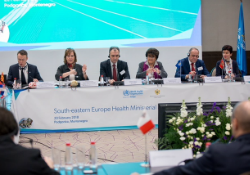12 European countries commit to greater efforts to protect people from vaccine-preventable diseases

WHO/Željko Bracanović-Kokos
Health ministries of 12 countries in south-eastern Europe and beyond have endorsed a statement of intent to speed up progress towards the goals and strategic objectives of the European Vaccine Action Plan 2015–2020 (EVAP).
Ministers of health and other country representatives embarked on a joint effort in Podgorica, Montenegro, on 20 February 2018, to create a tailored roadmap focused on common challenges and opportunities to increase individual and community protection against diseases like measles, rubella, diphtheria and others.
Uneven regional progress
The WHO European Region has made real, but uneven, progress towards EVAP goals and objectives, including measles and rubella elimination. As of the end of 2016, 42 of 53 countries had interrupted endemic measles transmission. However, following a record low of around 5000 cases in 2016, the disease rebounded in 2017, affecting more than 21 000 people.
“The countries in south-eastern Europe face many common challenges, which intersect and affect progress within and across their borders,” said WHO Regional Director Dr Zsuzsanna Jakab. “By establishing and pursuing this tailored roadmap we will contribute to stronger foundations for immunization in the subregion and to the health and well-being of everyone in the European Region as a whole.”
“Even where we see a few cases, we must acknowledge that this indicates a weakness in our health systems and an inability to stop totally preventable diseases,” said Mr Milutin Simovic, Deputy Prime Minister of Montenegro, at the meeting. “Hospitalization and deaths at the hands of measles, diphtheria or pertussis should be considered completely unacceptable. We have the ability, the resources, the commitment and collaborative spirit to stop this occurring in the future.”
New roadmap to drive subregional actions
The meeting was attended by the ministers of health or other health ministry representatives from Albania, Bosnia and Herzegovina, Bulgaria, Croatia, Israel, Malta, Montenegro, Republic of Moldova, Romania, Serbia and the former Yugoslav Republic of Macedonia. All endorsed the statement of intent, along with Slovenia’s Ministry of Health, which did not have a representative present.
In endorsing the statement, ministers called upon WHO to act swiftly in a few key areas, including:
- proposing options for joint procurement of vaccines;
- supporting capacity-building on resource mobilization for sustained financing of immunization programmes;
- establishing a subregional centre on vaccine demand;
- strengthening the role and responsibilities of the National Immunization Technical Advisory Groups.
Ministers approved the development of a roadmap that will outline the activities and initiatives to be implemented in the subregion to meet specific strategic objectives. They expressed interest in holding consultations as the roadmap is developed, in partnership with WHO and key immunization stakeholders and donors in the Region.
Additionally, roundtable discussions at the ministerial meeting focused on priority topics for south-eastern Europe, such as:
- integrating immunization programmes into strong health systems by coordinating with other programmes, the private sector, partners and communities;
- making policy decisions based on evidence and data;
- country-specific and joint actions to counteract antivaccination sentiment and stimulate demand for routine childhood vaccination.
The outcomes from the Montenegro meeting will feed into the discussion on the mid-term progress review of the EVAP, to be held at the 68th session of the WHO Regional Committee for Europe in September 2018.



